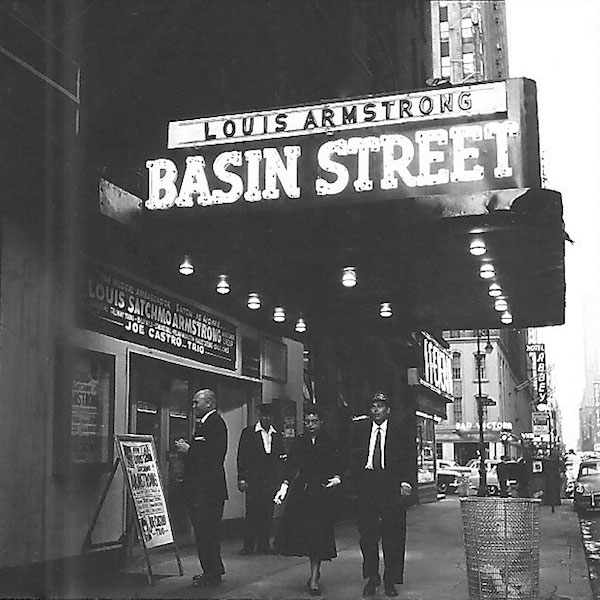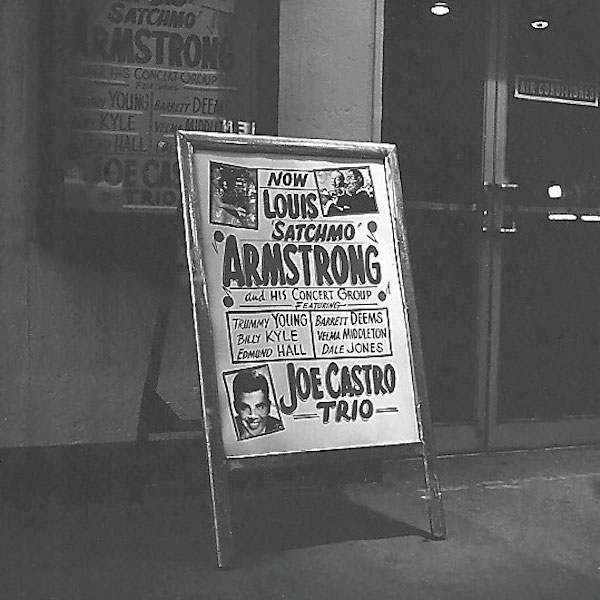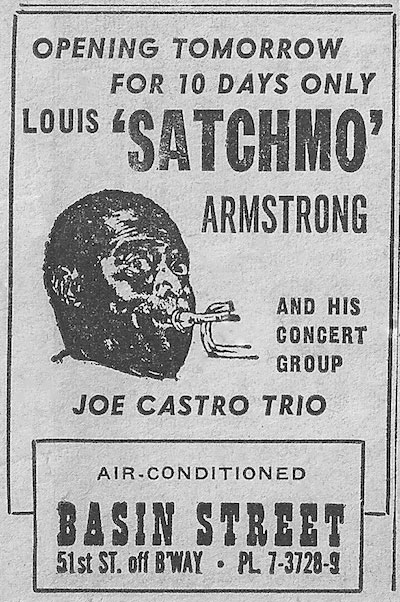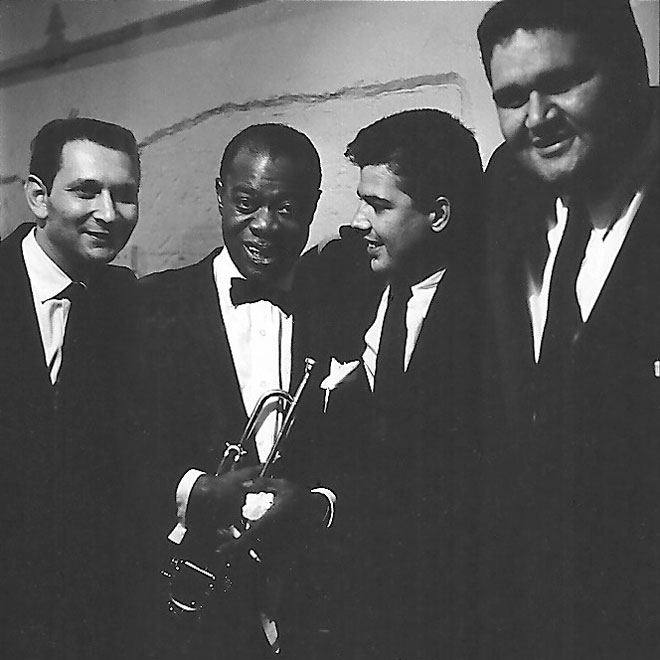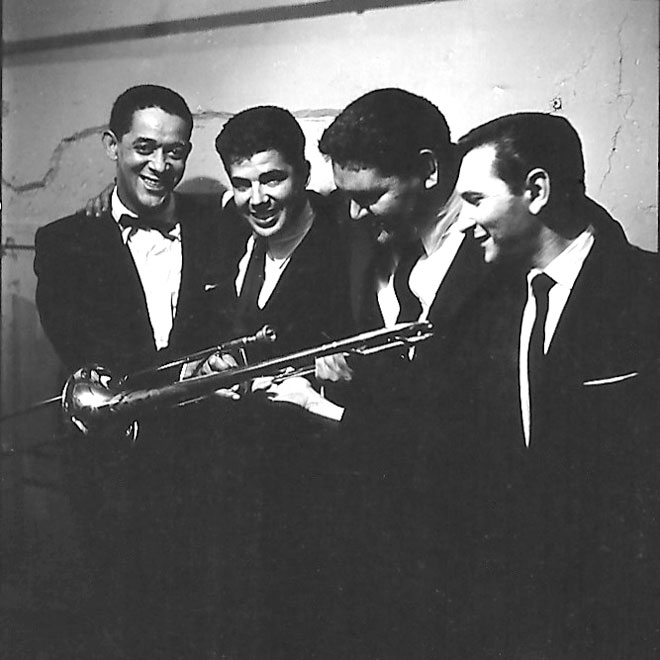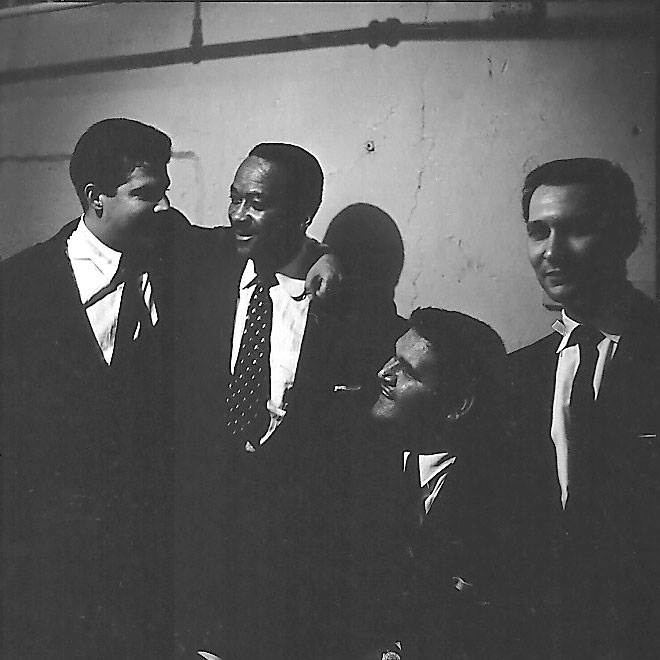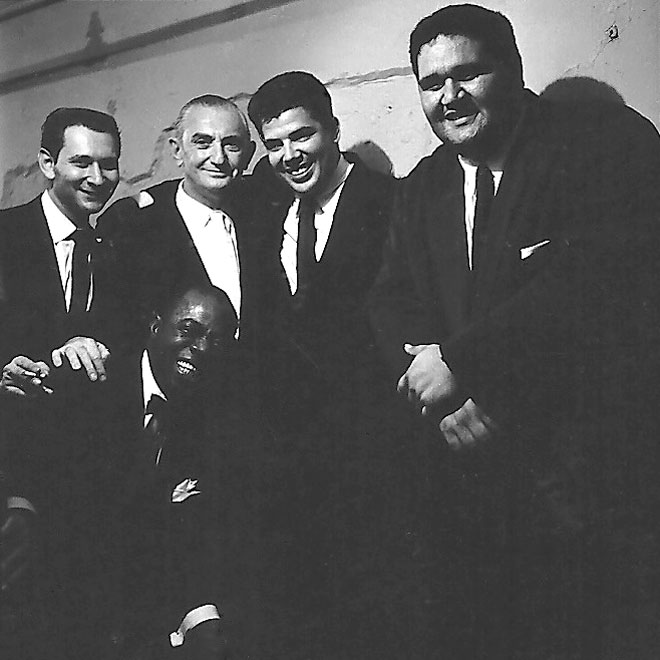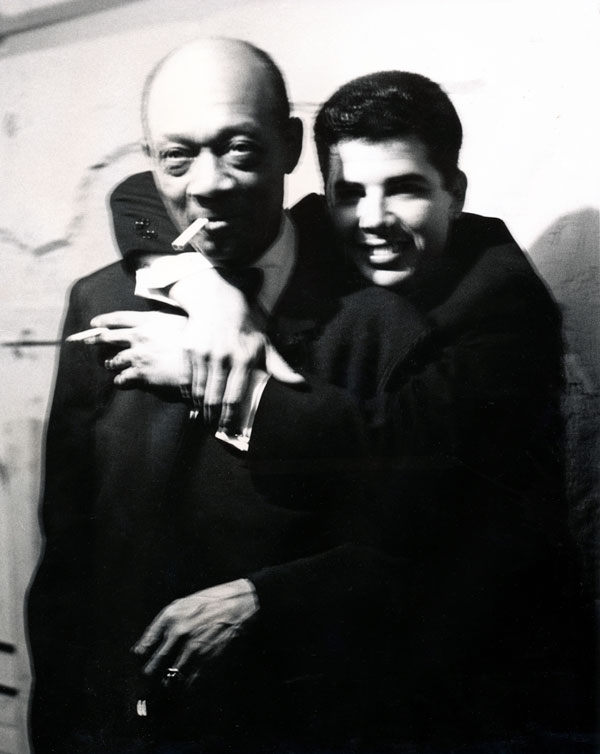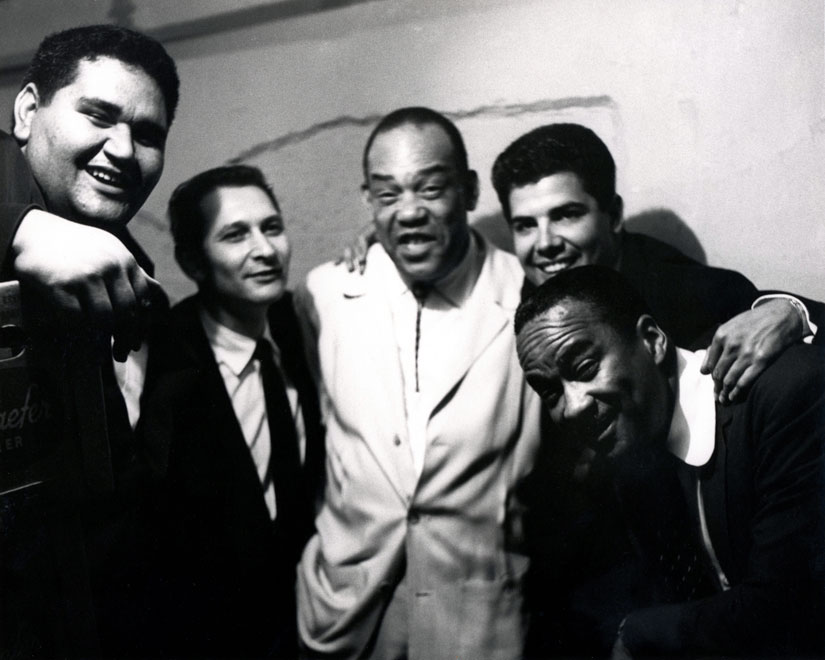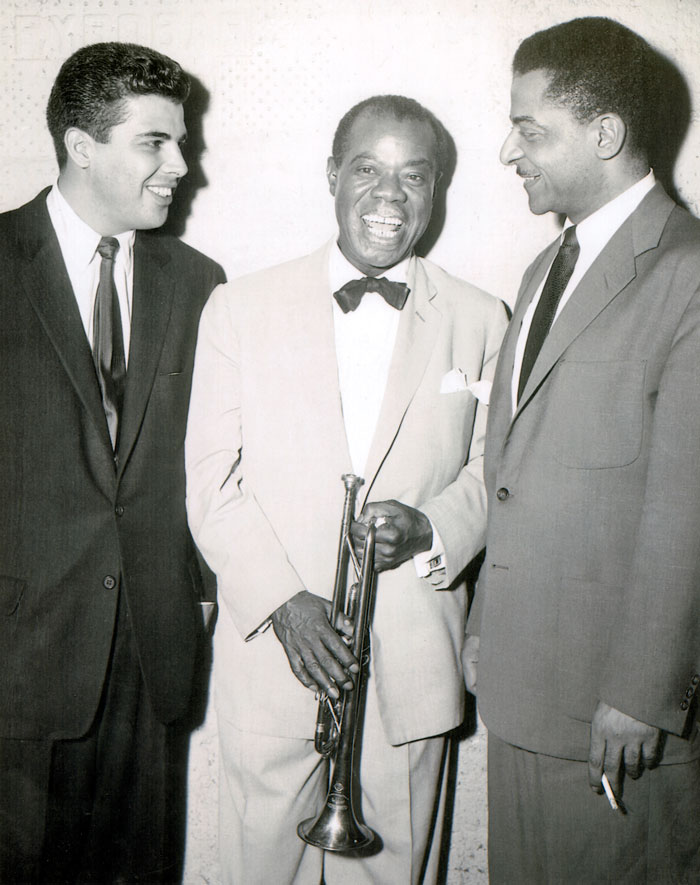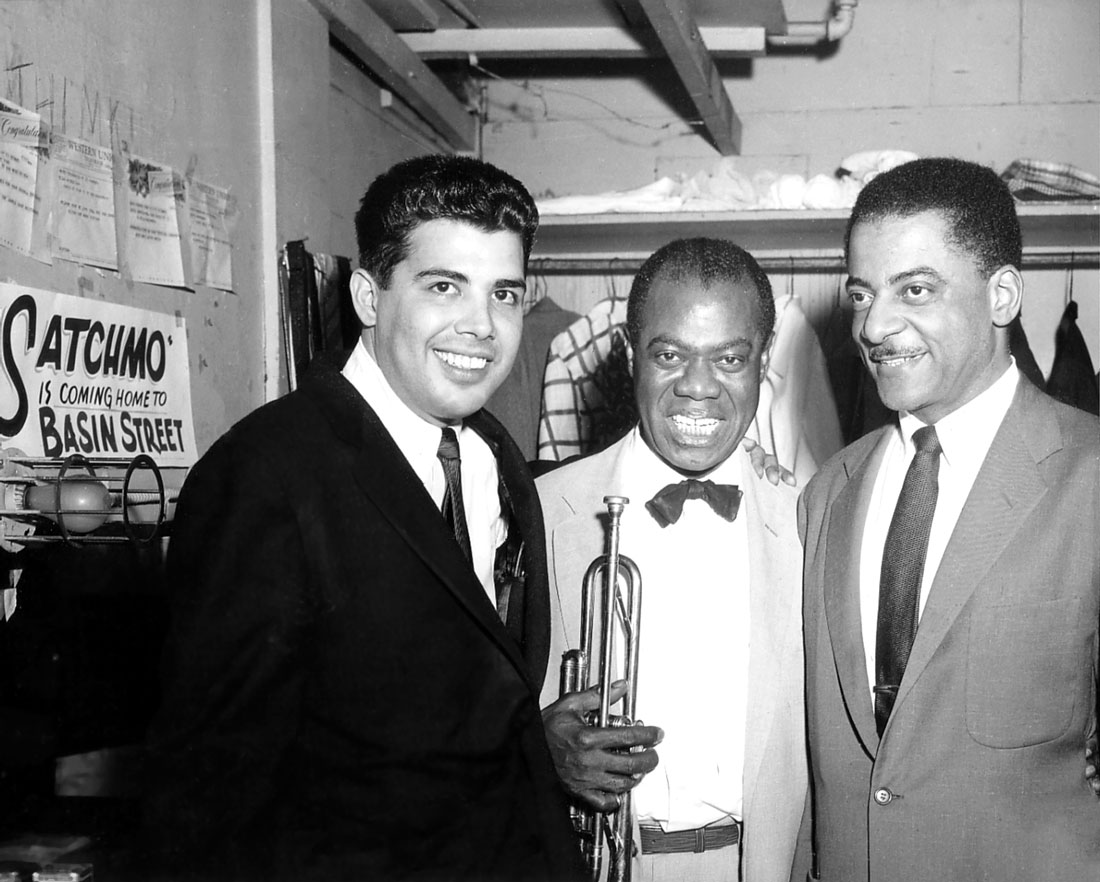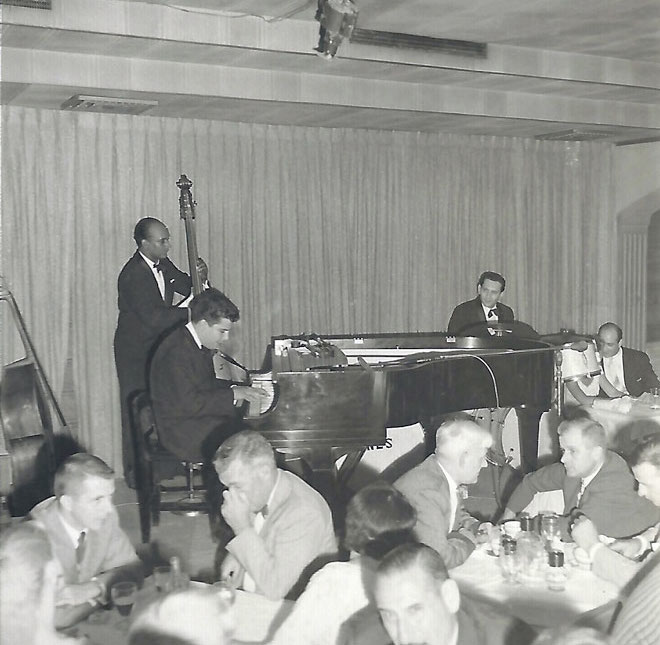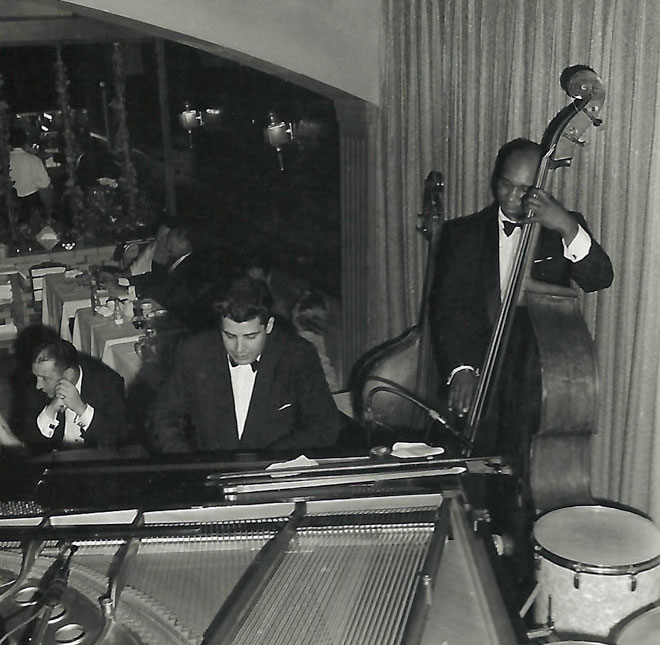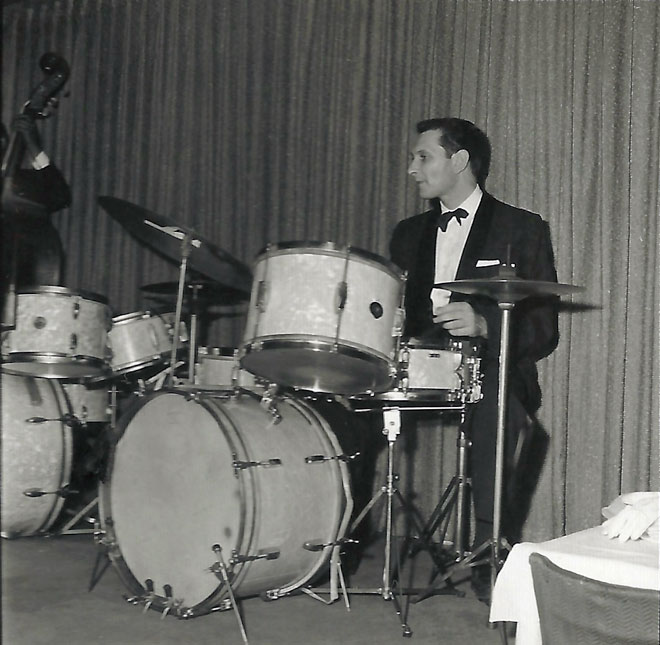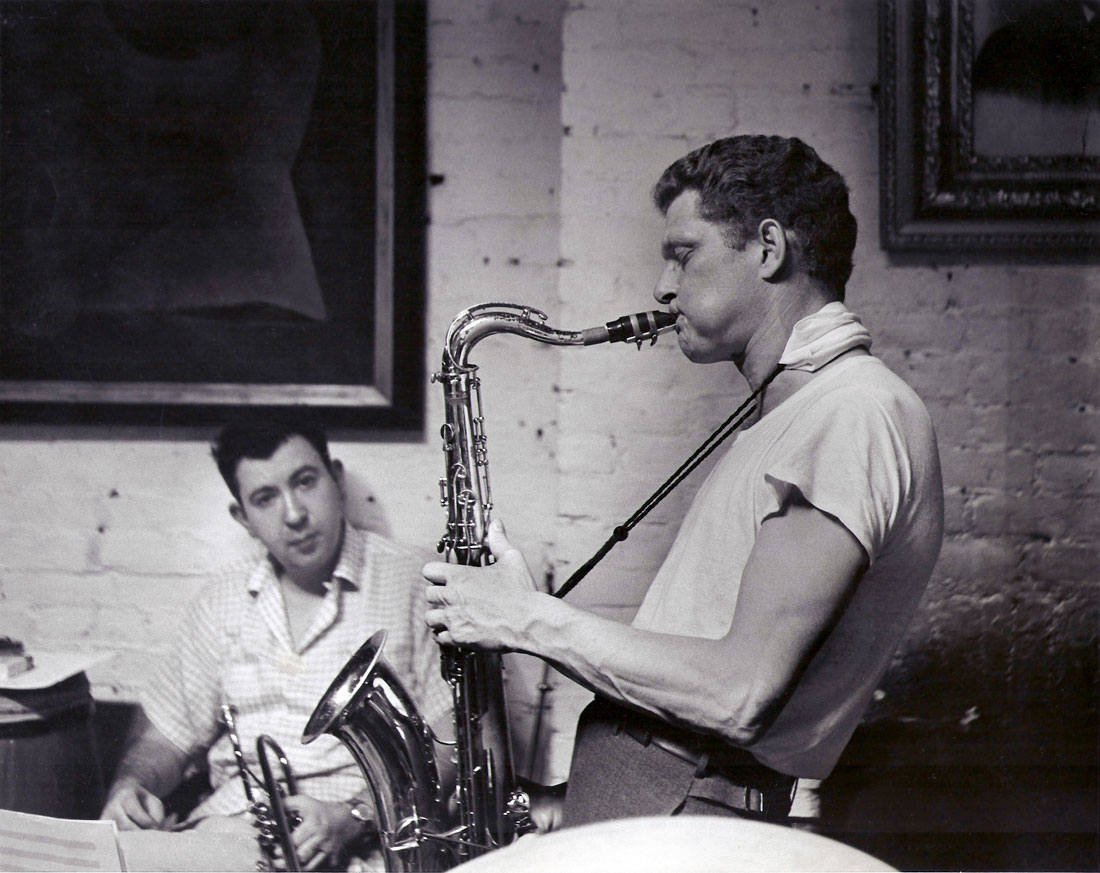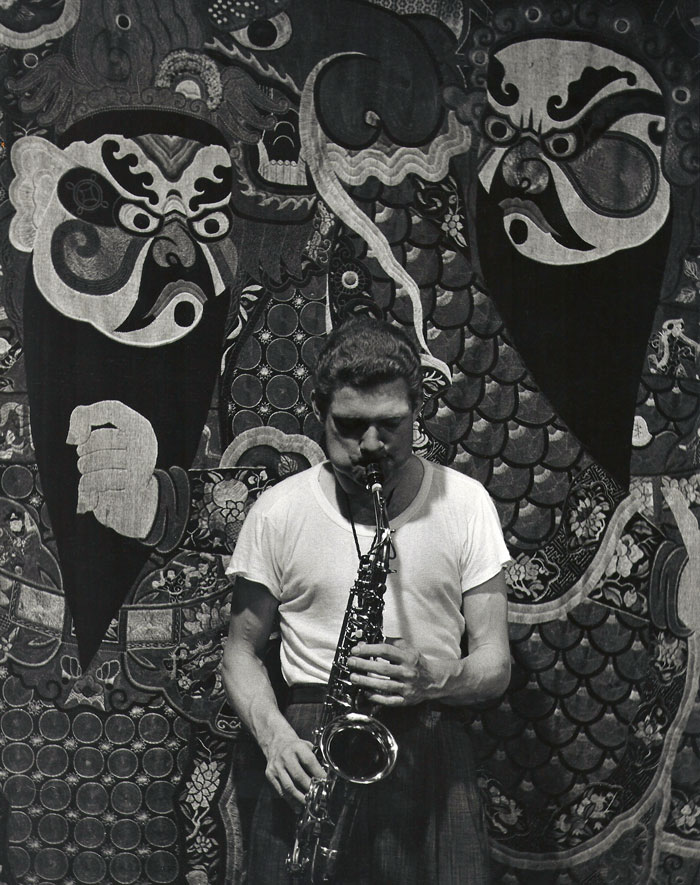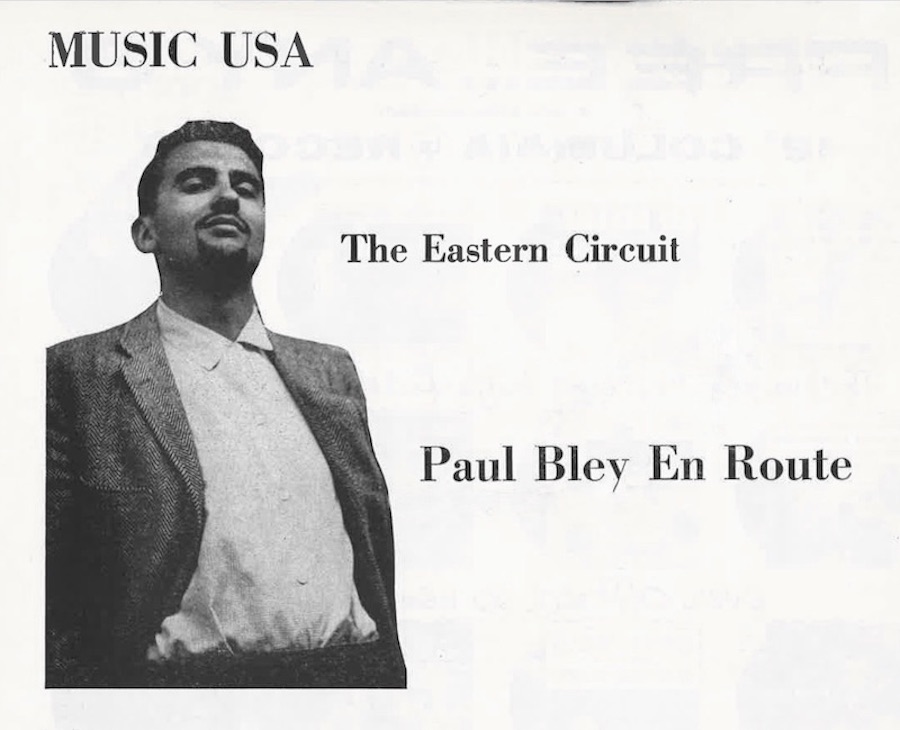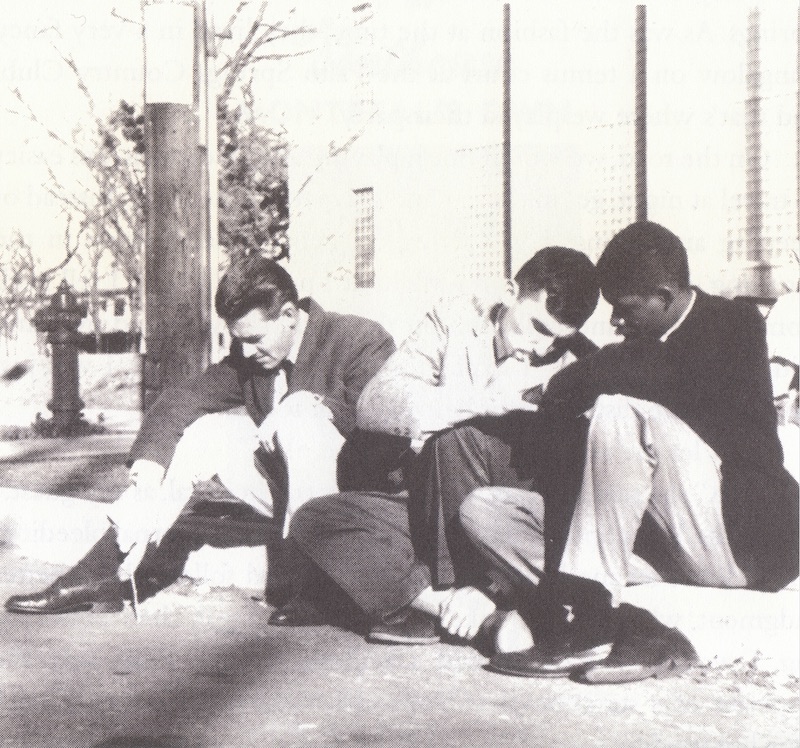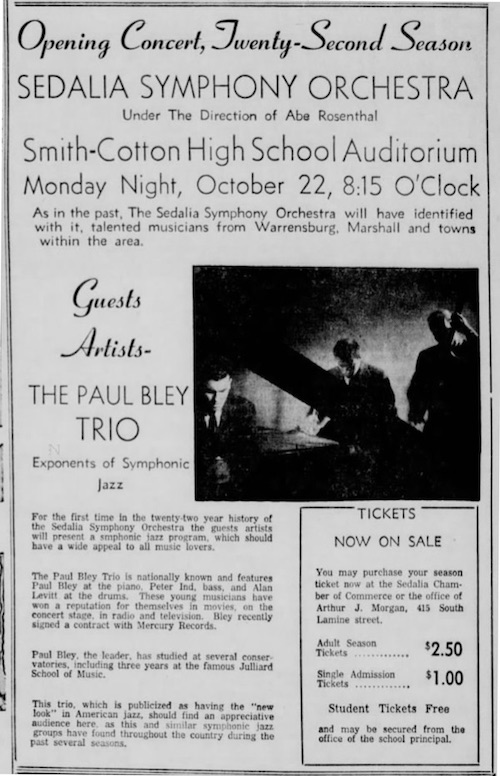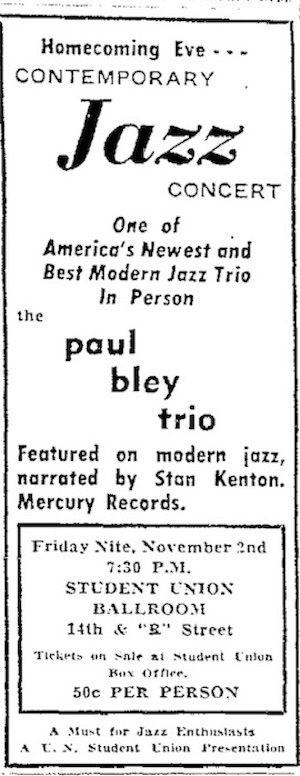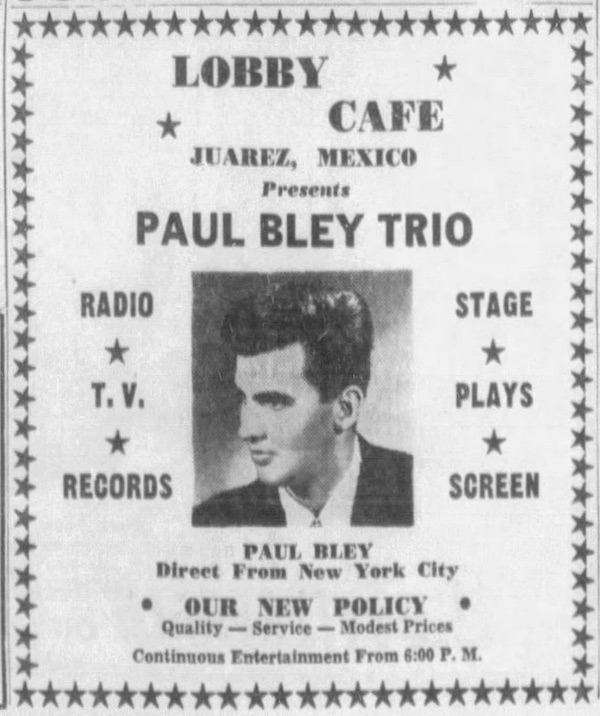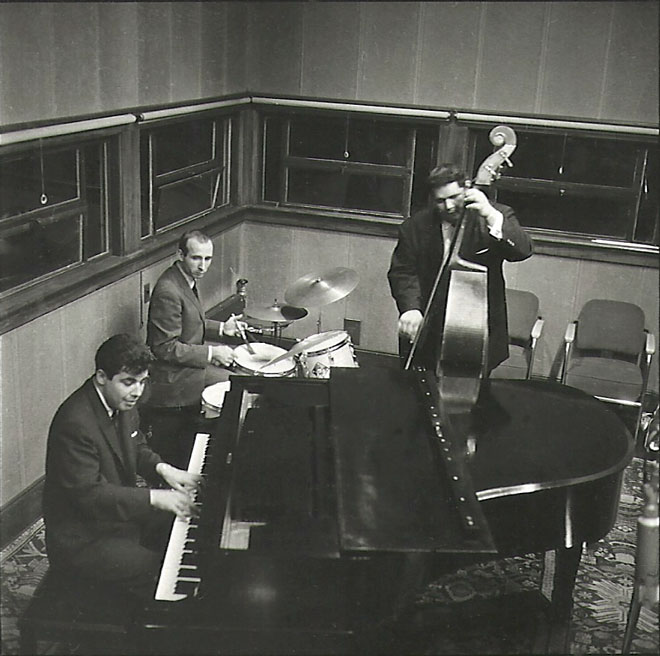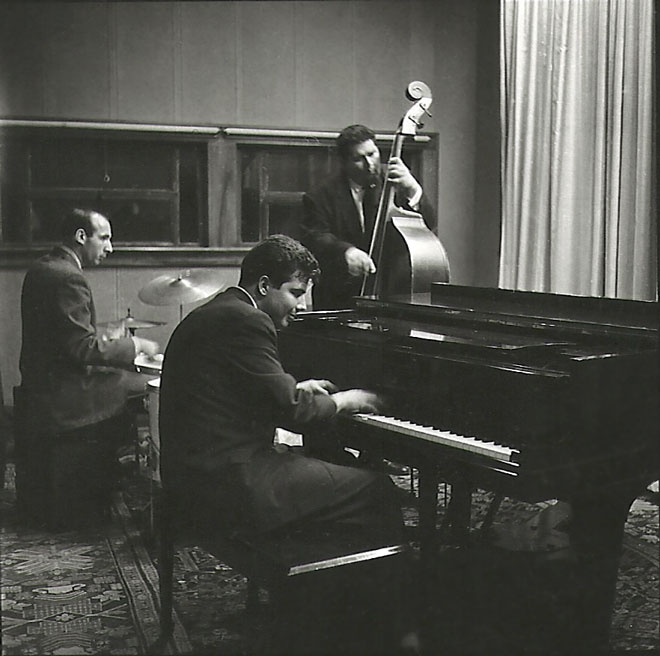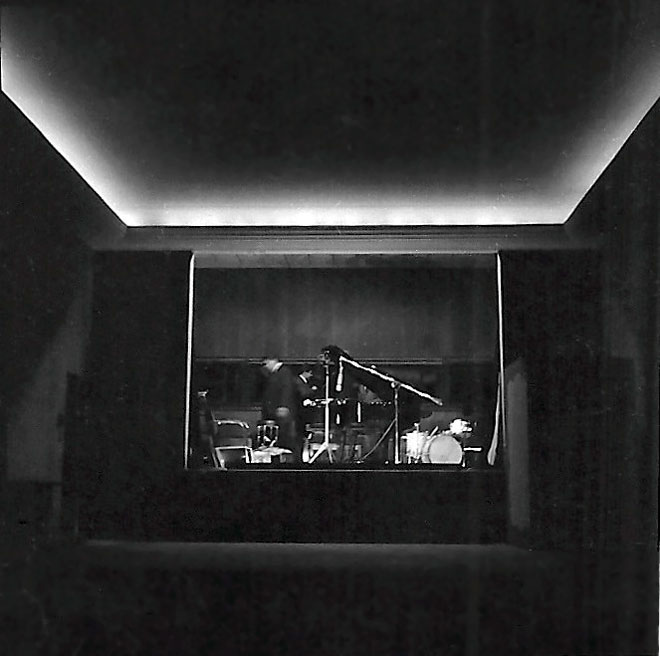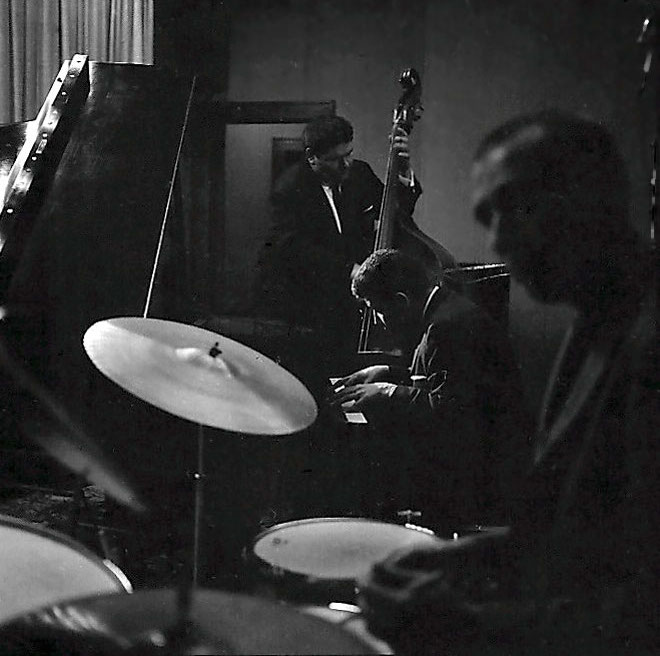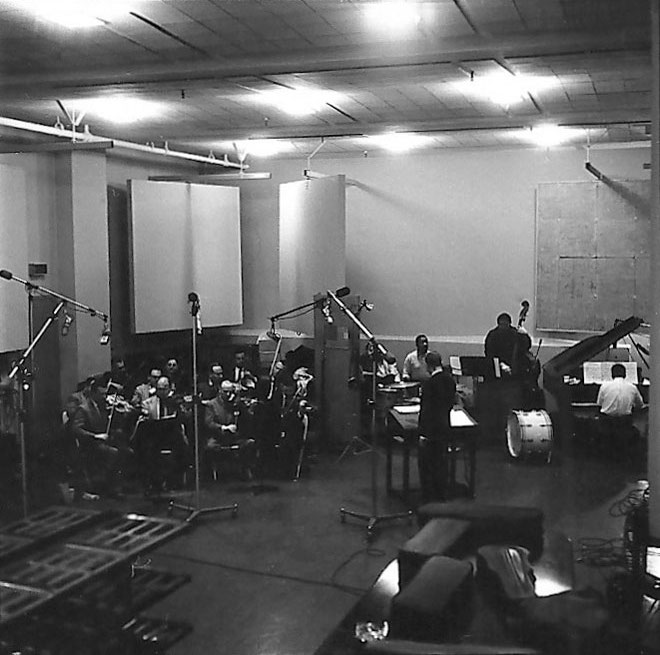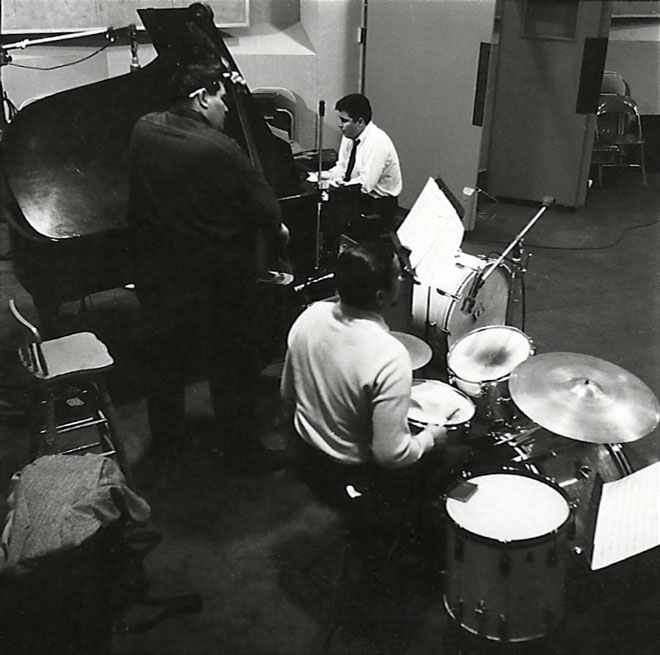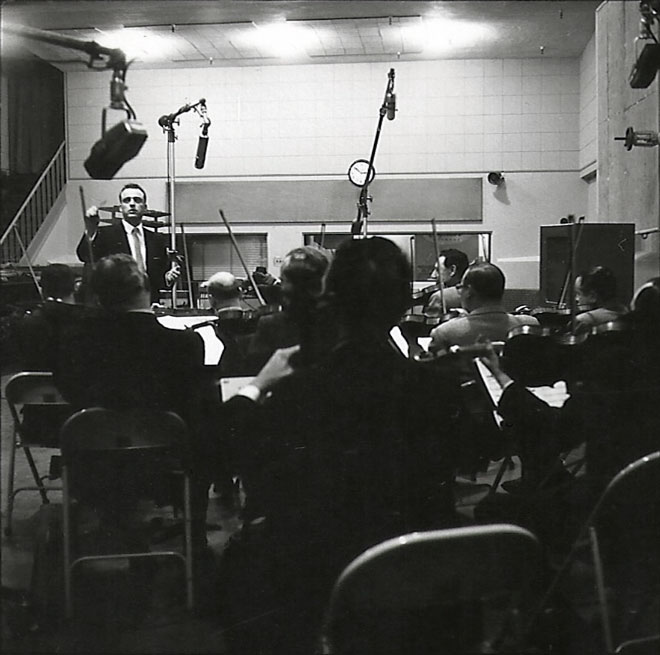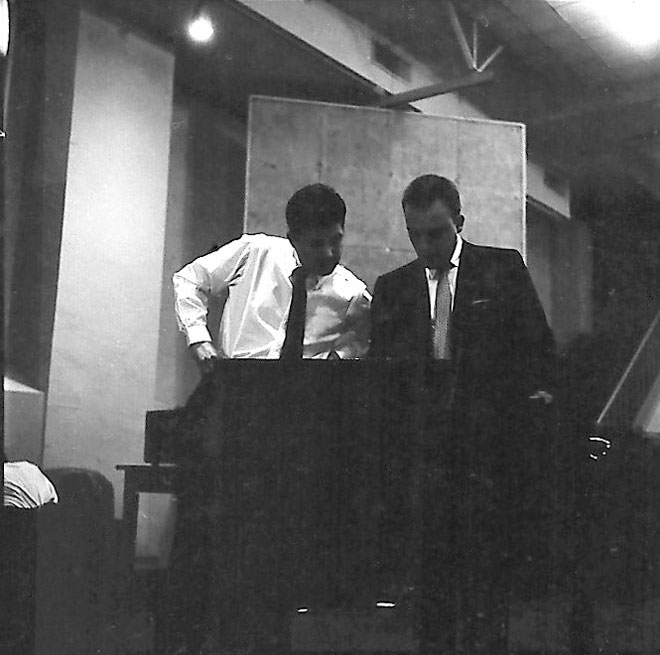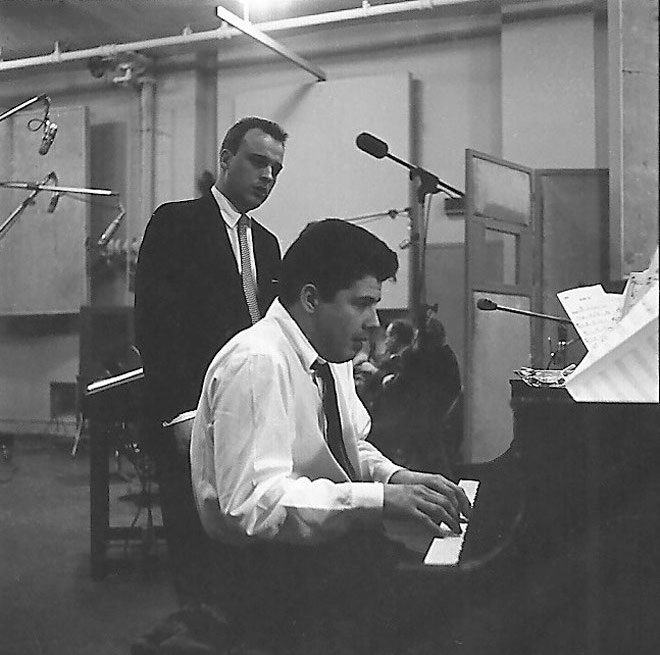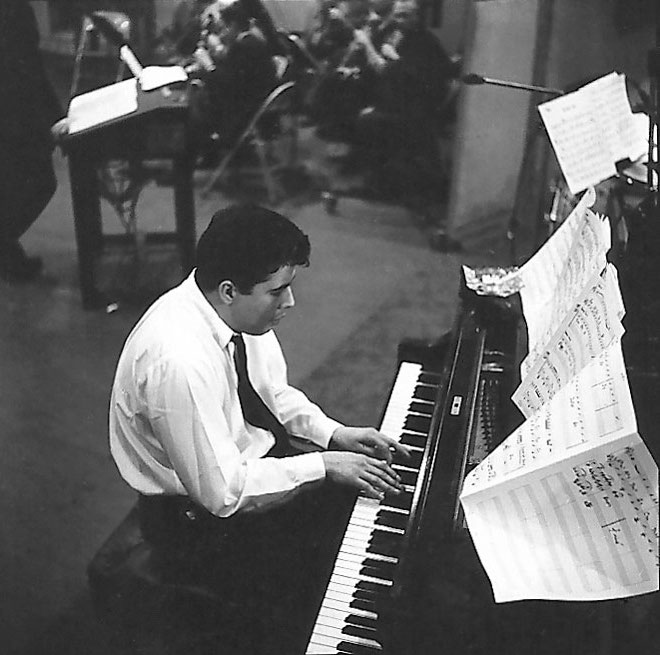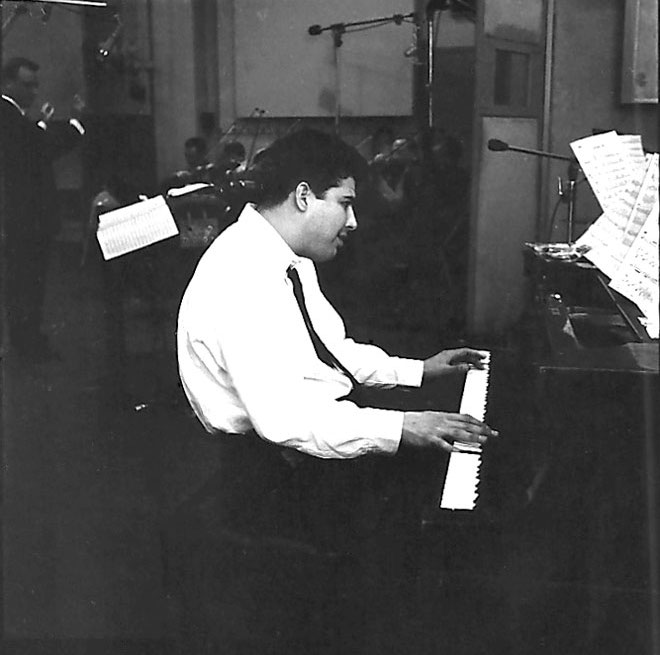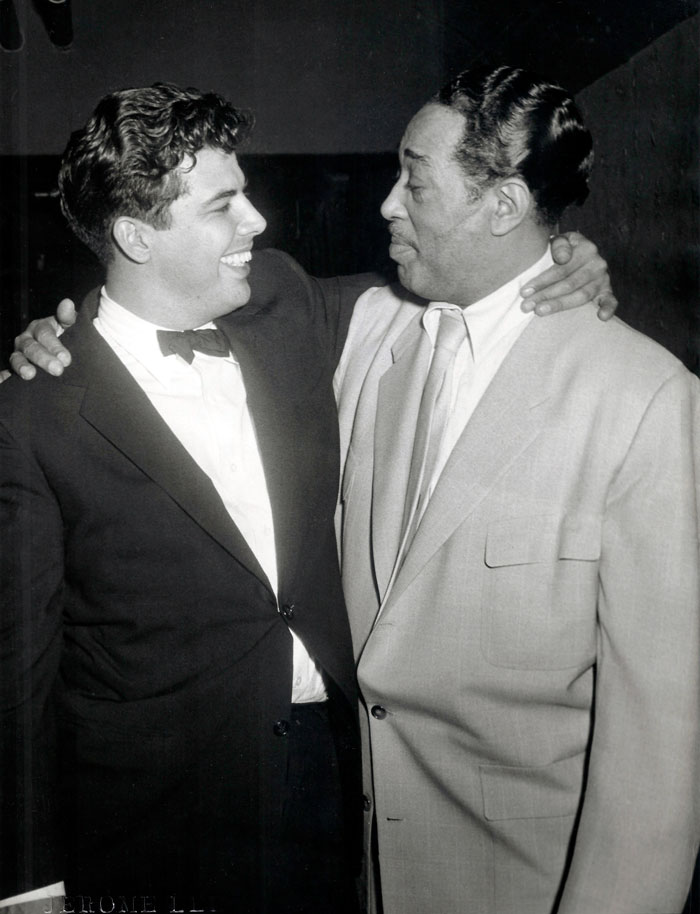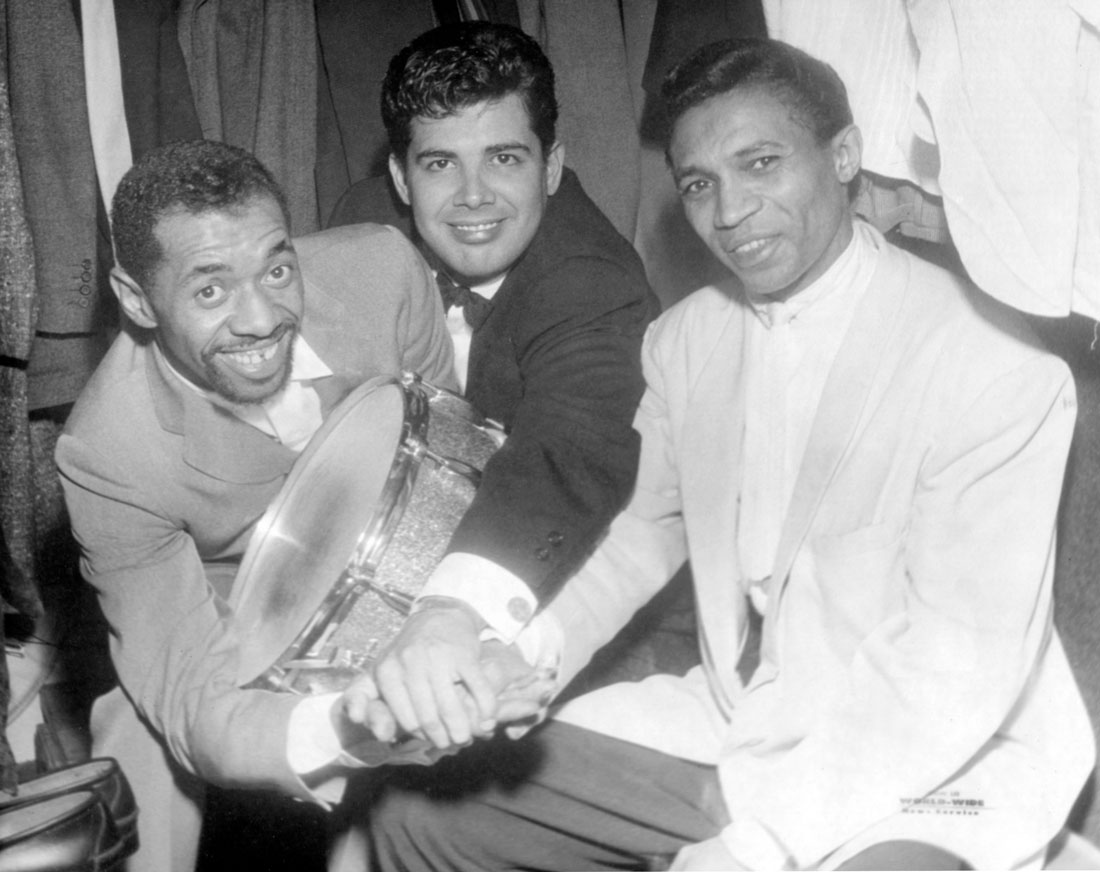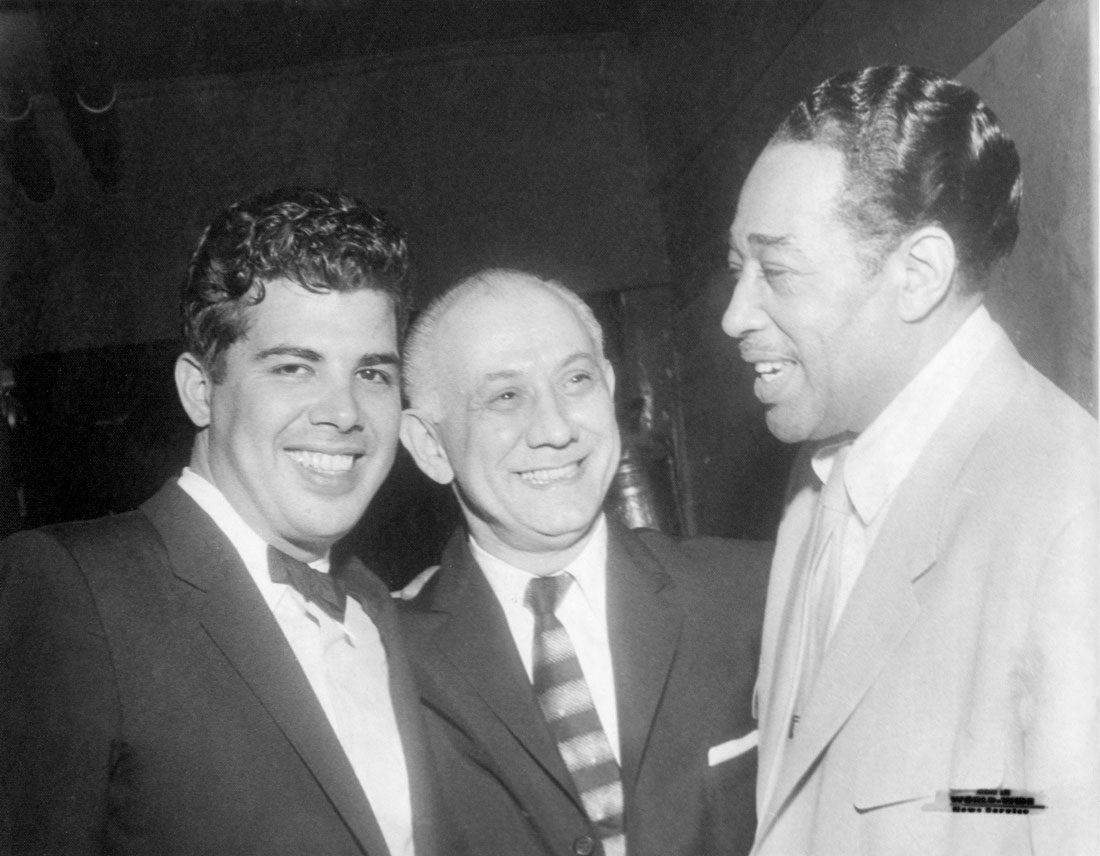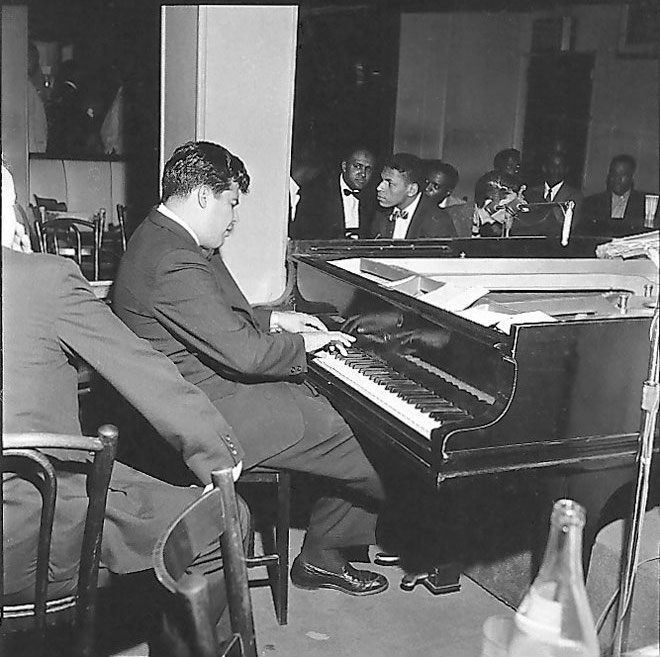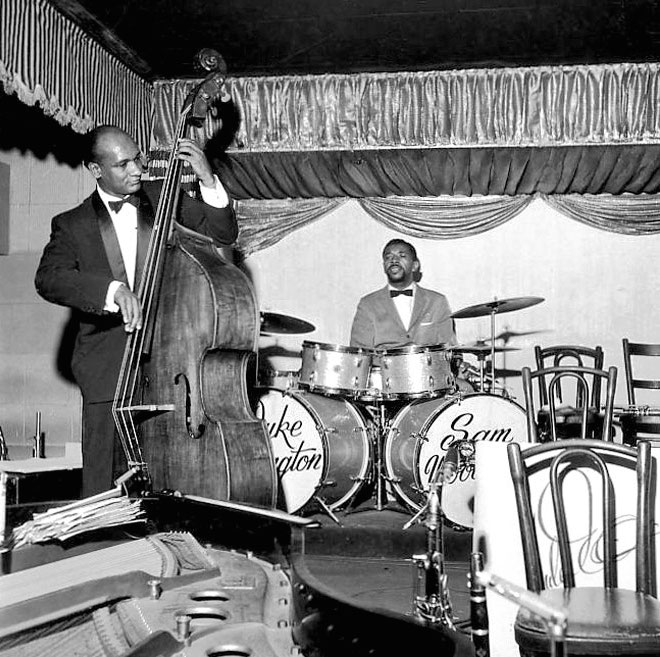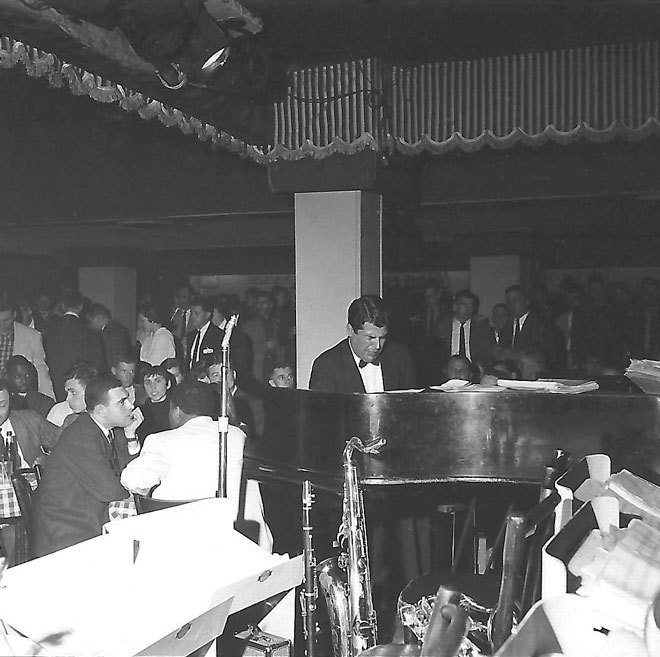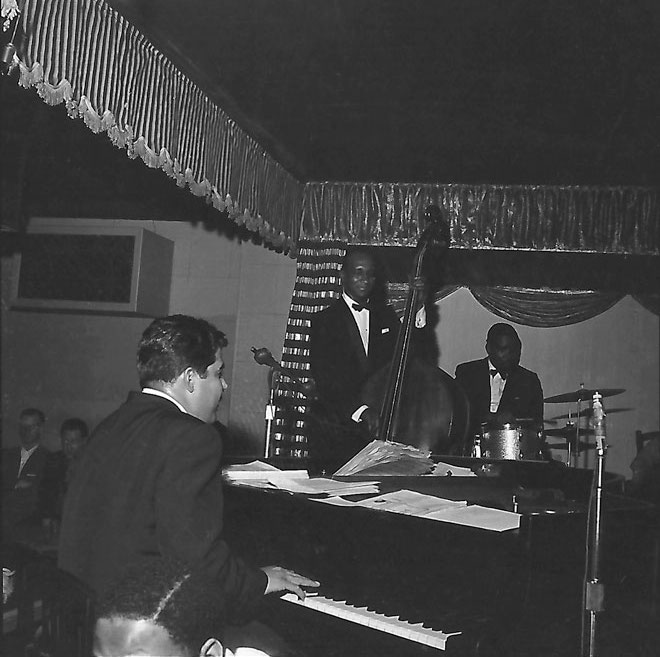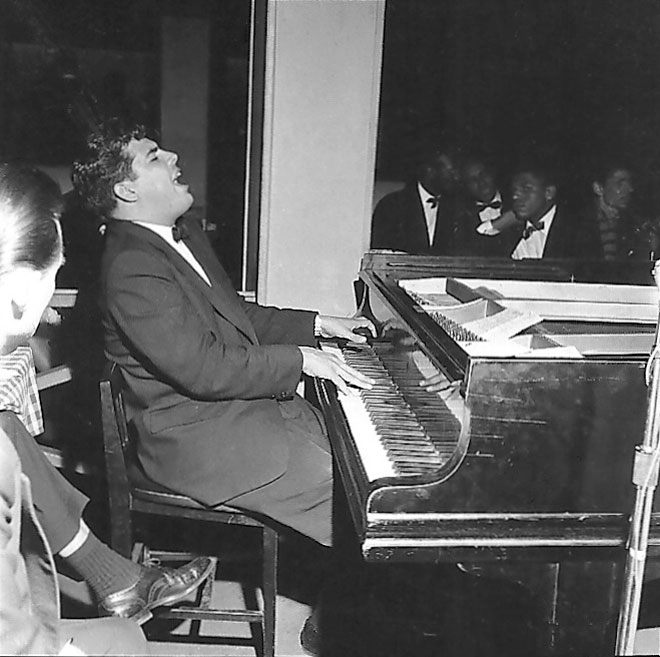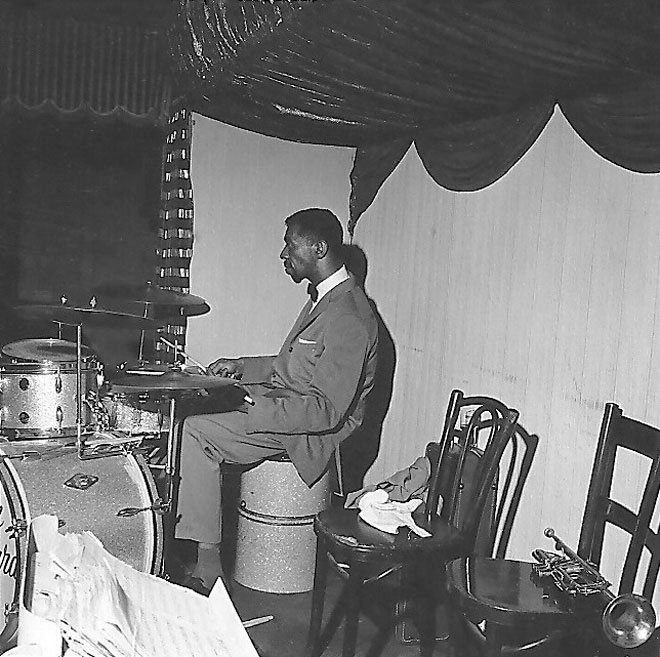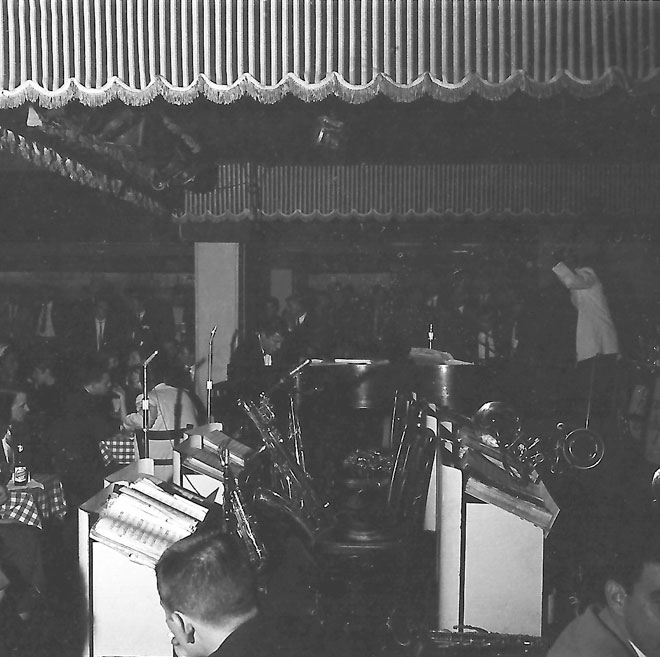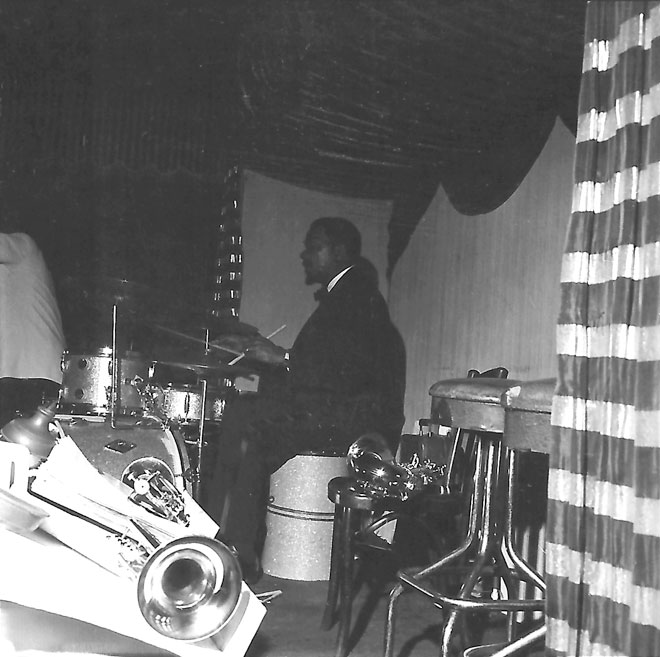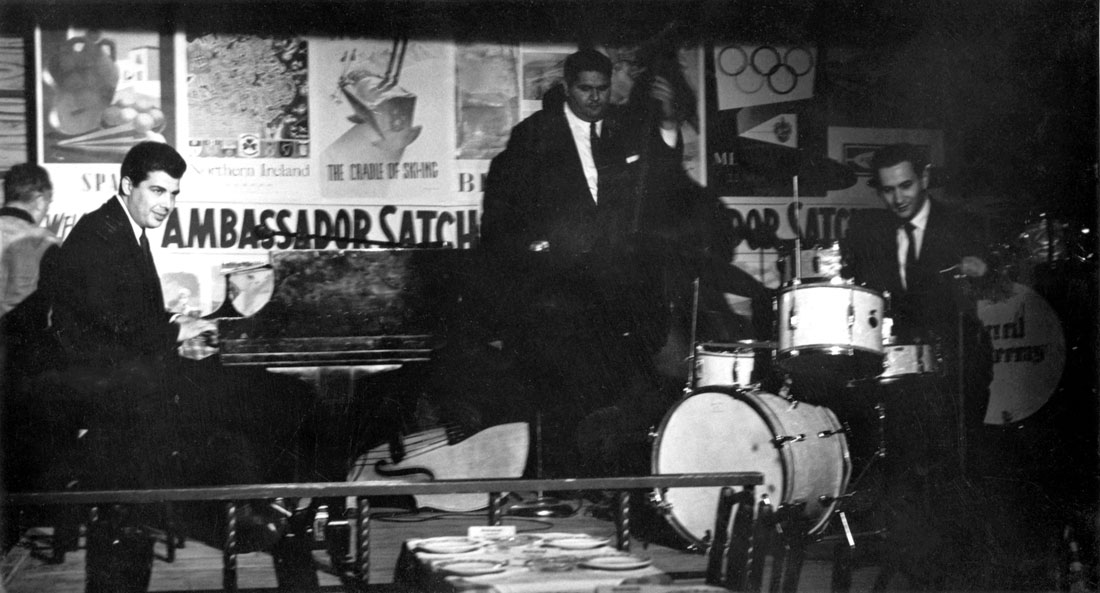
(James Castro Collection)
Castro was in the midst of his most important East Coast performance opportunity, his New York City debut. He and his trio, featuring drummer Ted Sommer and bassist Ed Shonk, were opening for Louis Armstrong for nine days[•] at Basin Street, which was located on 51st and Broadway in Manhattan, well supported by Sid Shalit and Jean Shepherd.
Sid Shalit: Jean Shepherd, WOC-radio’s unique middle-of-the-night humorist, one of the early discoverers of pianist Dave Brubeck, figures he’s got a sure-fire way of increasing his audience. Shepherd’s been playing records by a great new West Coast pianist, Joe Castro, and exhorts his listeners to order them at their local music shops. Since the “recordings” Shepherd plays are Castro’s private tapes, unavailable yet for purchase, music shop clerks are going crazy trying to fill the orders. “This has got to cause insomnia among thousands of music shop employees,” deadpans Shepherd, “and insomnia is all-night radio’s lifeblood.” As for Castro, he feels being discovered by Shepherd is a “tiring” experience. “Jean keeps telling his listeners—in the early hours of the morning—to cheer me on and gives out my phone number. They get right on the phone, wake me up and do their best to encourage me. It’s all very discouraging.” Sleepy-eyed Castro can’t wait for his opening at Basin St. Thursday night and at the Embers and the Composer later this summer. He figures the only way he can escape being awakened at 3 a.m. by Shepherd’s listeners is to work all night.[•]
The trio then moved over to Embers at 161 E. 54th St. on July 2, where they performed opposite Teddy Wilson.[•]
Gros: While the majority of the young Coast cats have been doodling in the ultra-modern groove, 25-year old Joe Castro has been developing a straightforward swinging, keyboard style. There's enough inventiveness and imagination poured into his work, however, to enroll him in the hipsters' cult. Incubating with commercial combos on the Coast, Castro has taken just enough of the so-called “square forms” into jazz field segue to give his Steinway styling a highly listenable beat. He lays 'em down with clarity and assurance holding on to the swinging tempo throughout the set. The Embers run is his second eastern gig, he broke in the trio at Basin Street, jazz joint on the other side of town, last week, but he's already got the qualities to pull in the trade who comes strictly for listening as well as those who want a swinging backing for their dining, gabbing or tippling. Combo also shapes as a strong bet for the disk field. Castro already has cut some independently made masters, currently being auditioned by several record companies, and is set for a session for Epic Records in the next few weeks. If he can capture on wax the musical vitality displayed in a live date, he'll rank high among the jazzsters who are putting their stuff in the groove today. Rounding out the rhythmic beat with Castro are Ed Shonk, bass, and Ted Sommer, drums. Both boys are topnotch instrumentalists and ride along with their leader in fine form.[•]
Castro recorded again at Duke Farms with the tireless Zoot Sims, who was then performing at the Café Bohemia.[•]
Musicians recorded at Duke Farms:
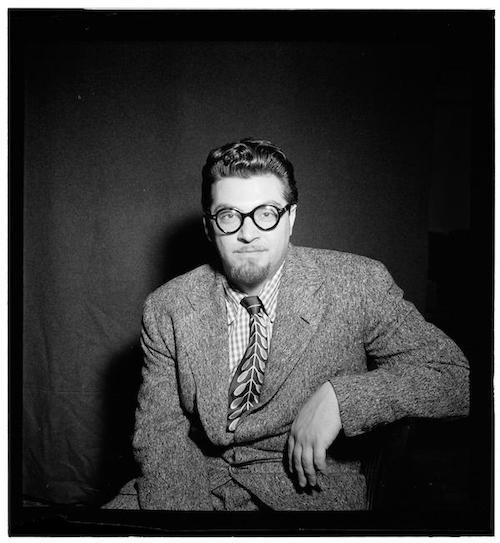
(William P. Gottlieb Collection, Library of Congress[•])
Some of these recordings made at the beginning of 1956 and some that followed were seemingly made for Doris Duke and Joe Castro’s stillborn first label, Spirals Unlimited (or Creations Unlimited). The original announcement of the label had made by columnist Earl Wilson in his “Happened Last Night” from April 24th[•]: “Jazz fan Doris Duke will launch a record company headed by her beau Joe Castro….” Variety from August 8th[•] formally introduced the Spirals Unlimited independent production company that planned to record Flo and George Handy, Chuck Wayne, Zoot Sims and Joe Castro, two weeks later Down Beat's Strictly Ad Lib from August 22nd[•] gives roughly, and in a shorter form, the same thing, except Spirals Unlimited has been renamed Creations Unlimited.[•]
As noted in the announcements above, Castro recorded two projects by George Handy, one written for and featuring Eddie Caine, The Caine Flute Sonata, and the other with Handy’s wife Flo, consisting of two formations, voice and piano duet and an orchestra of twelve musicians, precisely dated and entitled "Flo Handy Sings George Handy.” The story of these mythical recordings is recounted here by Ben Bierman, expert and author of many works covering the music of George Handy, including his Ph.D. dissertation.
Musicians recorded at Duke Farms:
Flo Handy vocal; George Handy piano. August or first half of September 1956.
Another musician recorded during 1956 was the young Paul Bley, the musician "whose piano playing begins to fascinate jazz fans," as Bob Fulford wrote in an article announcing: "Paul Bley—Jazz Is Just About Ready for Another Revolution," Says Canada's Young Pianist” in the Down Beat from July 13, 1955[•].
Paul Bley was recorded with a trio and solo (sixteen years before his first solo release Open, To Love) before taking the road for a Midwestern "university tour.” Subsequently, he would end up in Los Angeles.[•].
The records on Paul Bley in Joe Castro archives do not contain any information. However, there are two likely possibilities on how and where the two musicians originally met, the first being sometime before the fall of 1956 and the other being sometime after the spring of 1958. The question was presented (without it was raised this information) to Ludovic Florin senior lecturer at the University of Toulouse - Jean-Jaurès and LLA-CREATIS laboratory member[•] in an effort to discover the chronologically without a conclusion, ici here.
Musicians recorded at Falcon Lair:
Castro continued his New York City residency at the Hickory House, the famous steak restaurant and jazz venue on 144 W. 52nd Street, from September 18th, 1956 through January 20 of 1957.[•]
Down Beat: Joe Castro, pianist protégé of millionairess-jazz fan Doris Duke, will replace Jutta Hipp when the German star ends her six-month run at the Hickory House on Sept. 16. He has an eight-week deal with an option for five more weeks [he would stay eighteen weeks]. Meanwhile, Miss Duke reportedly is ‘taking under advisement’ an offer to make her own keyboard debut. Long an Embers habitué, she had thrown many parties in her home for name jazzmen and has learned to play modern jazz piano in the process. The Embers has offered her a gig at scale, suggesting that her salary be paid to a worthy charity.[•]
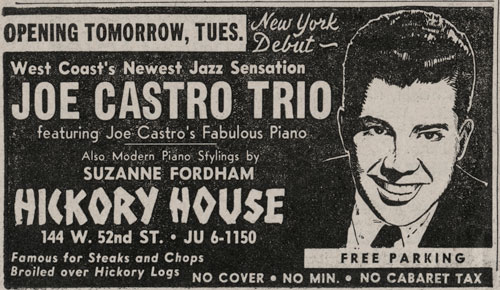
(James Castro Collection)
Castro:[•] I got booked into the Hickory House. Got Eddie Shonk and Buddy Greve to come and be with me. They came over to the Farm. We rehearsed, had dinner with Dorshka. Buddy brought his stripper girlfriend, what was her name? I forgot....[•] Buddy didn't like it too much. After a stay of about a week, he decided to leave so I had Philly Joe Jones the famous drummer who used Buddy's drums until Buddy took them. He (Jones) stayed about a week.... The head of the Hickory House John Popkin, warned: “You watch after that drummer. He uses drugs.” He did use drugs, so I told Philly: “You better cool it.” When he used drugs he went bad. He said something “goes bad,” and he’s watching you. So the day Buddy took his drums back...no drums, no Philly Joe Jones, no nothing…. So we decide to play without a drummer. He [Jones] came later that night. “Come on have a drink...what can I tell you?” So we got another drummer who played with Count Basie, Ella Fitzgerald…Gus Johnson. He stayed the whole engagement. We learned a lot from Gus...then we got an apartment in Manhattan, so we didn’t have to go back and forth....
The overall press response was good:
Robert W. Dana: “Excellent Jazz Trio at Hickory House," John Popkin continues his pleasant habit of offering outstanding jazz instrumentalists at his Hickory House, 144 W. 52nd St., with the presentation of the Joe Castro Trio. A tip-off is the fact that the better musicians around town come in to listen a bit, then stay to admire the fine work of the group. These are young men, who play with the obvious pleasure of loving what they are doing. There are no such extremes as bop, progressive, cool or any other “far out” manifestation of jazz to make the music hard on unaccustomed ears. They play mostly standard tunes—the classics of jazz—with imaginative, knowing arrangements of great taste. It is good jazz, highly listenable jazz. Joe Castro, the piano player, composes, arranges and is altogether an ambitious, highly literate and a delightful person as an artist and a person. Eddie Shonk, the big bass player played with the San Francisco Symphony Orchestra. He also composes and arranges. Buddy Greve, the drummer, also writes and arranges. The beat of the trio is good, the individual musicians excellent, with the rhythm section integrating well the lead piano. And yet the absence of any identifiable influence is strange....[•]
Whitney Balliett: Joe Castro, the young West Coast pianist who heads the trio inside the circular bar, is still in between influences, but it is clear he has been to a good progressive school.[•]
After approaching record labels like Epic and Blue Note,[•] Castro was able to pick up a contract to record an album for Atlantic Records.[•] Castro would produce an album as J.C. Recording Company, using money advanced by Duke, a total of $6,357.94.[•] The deal with Atlantic was dated November 2nd, 1956 and signed January 31, 1957.[•]
Castro appeared on NBC’s radio program, Monitor, on Saturday at 11:45 p.m.: “He [Joe Castro] is the West Coaster whose ‘pure’ jazz trio is broadcast from Hickory House....”[•]
Columnist Dick Kleiner:
Joe Castro, Atlantic Records' jazz pianist, debuted in nightclubs when he was 14. Did his parents worry about him? “No, not a bit,” says Joe, “Of course, they came to the club with me every night and stayed next to the piano until closing. But I wouldn't say they were worried.”[•]
The first session of a concept album clearly displayed as:[•] Mood Jazz – with Voices & Strings Atlantic 1264, was recorded on November 19th and featured Castro’s trio with bassist Ed Shonk and drummer Philly Joe Jones, along with an orchestra arranged and conducted by Ray Ellis.
Joe Castro New York Atlantic Session:
Whitney Balliett wrote in The New Yorker’s last issue of November (Castro’s ninth week at The Hickory House): ”Inside the circular bar is a trio led by Joe Castro, who performs amazing feats of legerdemain on his piano in the course of working out his own progressive philosophy.”[•]
Castro appeared on Will Rogers, Jr.’s CBS-TV program “Good Morning!” at 7:00 a.m. on Wednesday, January 16,[•] and Wednesday, January 23, 1957.[•]
The next session was January 30, 1957 with the trio (now with drummer Gus Johnson) along with the Neal Hefti Orchestra.
Joe Castro New York Atlantic Session:
The third, and final, session was on February 2nd and had the trio along with chorus with two special guests, Nat and Julian “Cannonball” Adderley,[•] who appeared under the pseudonyms of John Hannan and Glenn Prescott, respectively, because of their EmArcy-Mercury contract.[•]
Joe Castro New York Atlantic Session:
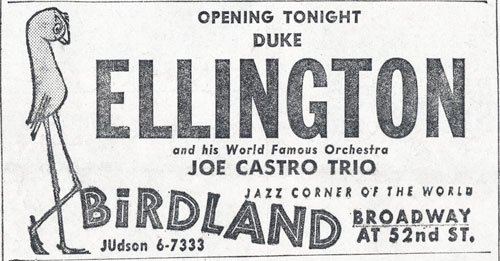
After the recording, Castro and Duke retreated to Honolulu to prepare for an upcoming Asian trip. The two arrived in Hong Kong on February 28 then went on to Thailand, Ceylon, India, Hong Kong, back in Thailand and then Burma and back again to Thailand. They were back in Honolulu by April 7th.[•] Two weeks later, Castro was opening for Duke Ellington Orchestra at the Birdland in New York City, beginning on April 18th.[•]
It is probably during this period with the Adderley brothers at Birdland[•] that Nat and Cannonball, joined by friend Philly Joe Jones, who had just been fired by Miles Davis after a long tour that ended at Café Bohemia,[•] are all found jamming at Duke Farms.
Musicians recorded at Duke Farms:
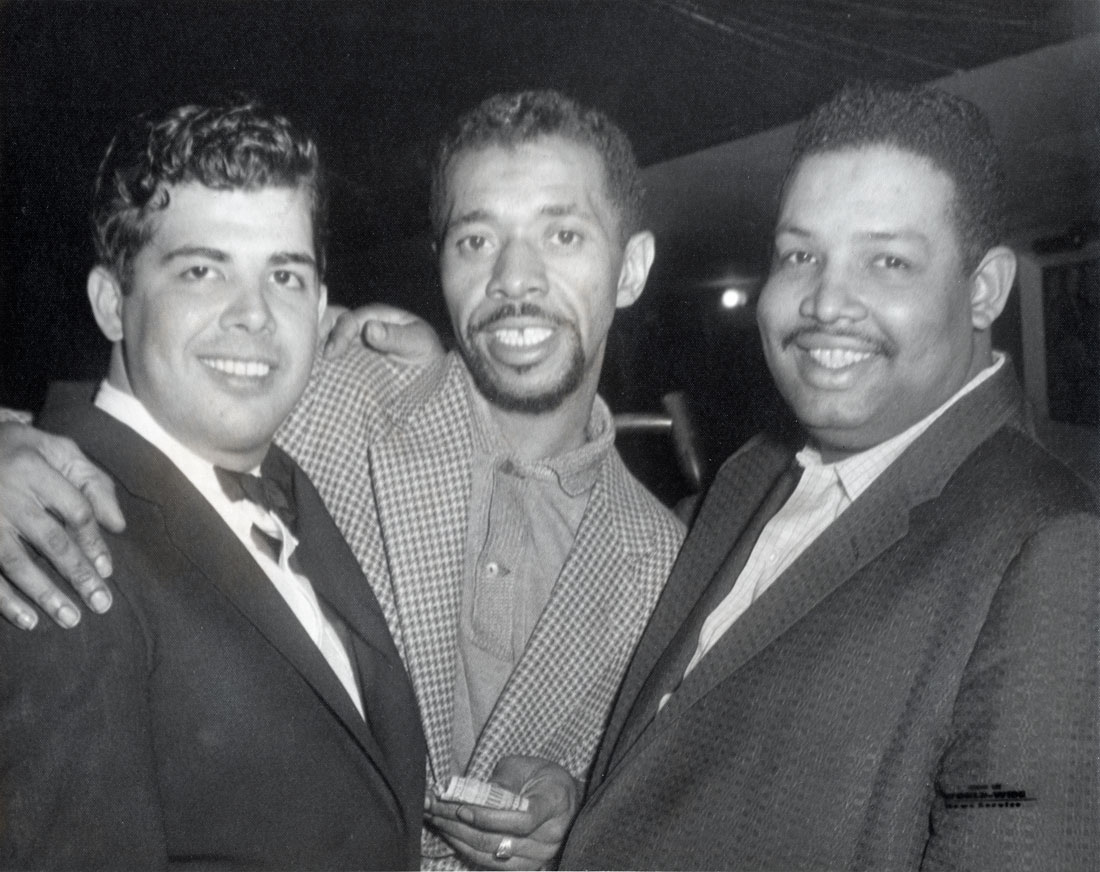
(James Castro Collection)
The summer witnessed a performance opportunity for Castro at the Newport Jazz Festival, though it was not mentioned in the official program.[•] He played Saturday afternoon, July 6th with a trio, featuring bassist Milt Hinton, who would play with Teddy Wilson that evening, and probably drummer Ted Sommer, after a set by Jackie Paris, and before Horace Silver. The reception was good:
John S. Wilson: Blues roots came out in the performance of Joe Castro, a relatively traditional swinging pianist who resorts to little discursive decorations. They were also present in the work of Horace Silver, a founding father of the modern “funky” style of piano....[•]
Gene Witmer: Pianist Joe Castro, backed by Milt Hinton on bass and Eddie Cummer [Ted Sommer] on drums offered a refreshing blues feeling. Their interpretation of These Foolish Things was reserved and moody, distinguished by a tasteful Milt Hinton bass solo.[•]
tbs: Joe Costa [Castro] (top) West Coast piano virtuoso gives his all.[•]
But in Down Beat, “Newport Jazz Festival Saturday Afternoon,” Don Gold, who was the Down Beat managing editor, murdered the man and his music:
In a program reshuffling, Joe Castro, best known as Doris Duke's discovery, played three tunes, in a kind of bluntly assaulting manner.[•]
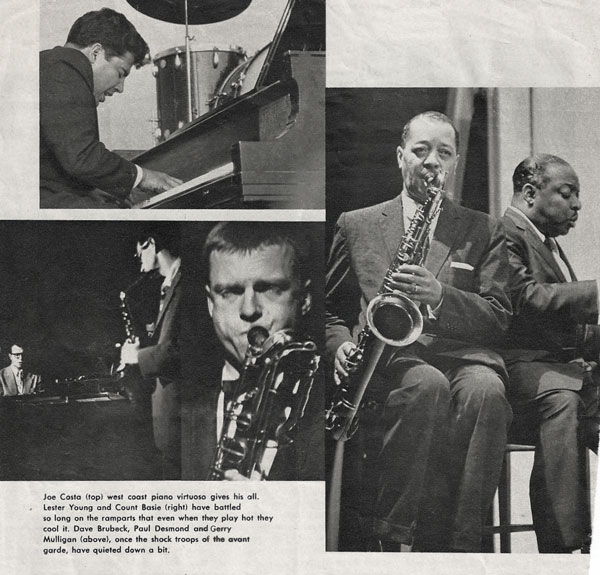
(James Castro Collection)
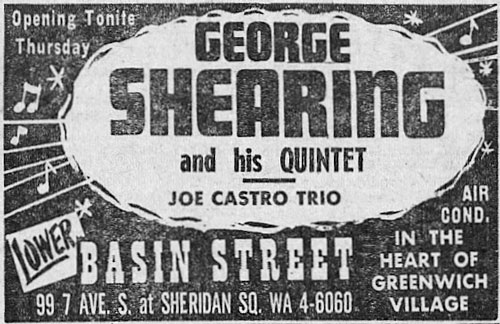
(James Castro Collection)
The next week, Castro shared a bill with pianist George Shearing at Lower Basin[•] St. at 99 7th Ave. South in New York City, his first gig with Paul Motian,[•] who he called, “One of the most remarkable musicians I've ever met.”[•]
There was a short trip in Europe, but Castro was back in New York by early August.[•] At the end of the summer, the first review of the album appeared:[•]
Edward C. Merritt, Jr.: With almost monotonous persistence, Atlantic Records comes up with quiet little contributions in the field of jazz, which have a firm habit of getting right down to the business at hand with little or no fuss and bother. This week it is the combination of pianist Joe Castro with several very small groups of rhythm and strings, plus a tiny bit of brass and voices. Whatever the group, this swings, and for jazz there is very little more that needs to be said.[•]
C.H. Garrigues: It is getting so that you can hardly pick up an album (even from a topnotch outfit like Atlantic) without finding a recording by a Bay area artist who, without honor in his own country, has gone East to wow them. Joe Castro (in case you, too, have never heard of him) grew up in Pittsburg, across the Bay, graduated from San Jose State, played gigs in the East Bay and in San Francisco and went to New York (where, incidentally, Earl Wilson recently described him as “the man who calls Doris Duke ‘my chick’”). Be that as it may, he shows himself here a jazz pianist of more than usual ability and demonstrates (with the aid of arranger Neil [Neal] Hefti and a flock of other jazzmen) that soft jazz can be firm, tight and gutty. The front of the album says ‘with voices and strings’—but don't let that bug you.[•]
And then in Down Beat by Don Gold again:
In this semi experimental collection, Castro's trio and quintet are embroidered with voices and/or strings. Eight arrangements are by Neal Hefti; Dream is a Ray Ellis arrangement. For the most part, this is, as the liner notes assert, a jazz LP. Castro, it seems to me, is a limited jazz pianist. Although he indicates a certain amount of pianistic skill, he is not a versatile, imaginative pianist. He tends to attack each tune with a sameness of approach—a kind of cross between the funky mode and Tatumesque flourishes. The members of Castro's group, when given the opportunity, support him adequately. Prescott, however, must be able to express himself with more inventiveness than he does here. Hannan, in the brief moments allotted to him, indicated that he's ready for better things, perhaps more so than Castro. The strings and voices are employed as accessories here. The strings, particularly, are used in an intrusive manner, punctuating the efforts of Castro's group without serving a beginning-to-end purpose on any given track. The voices, used entirely in a wordless context, are better utilized, but they, too, are not well integrated. Their presence does not enhance the group's sound, as they should to justify their use. It might be wise for Castro to record with the trio, plus Hannan and voices. In doing so, some effort could be made to give the voices some purpose as instruments, allying them to the sounds the group itself is created. If voices cannot be utilized fully, there is little point in utilizing them at all. On the basis of the ballad tracks here, by the way, Castro illustrates a fine potential in the pop field. If You Could See Me Now, for example, is not a moving jazz interpretation, but it is effective piano-with-strings pop material.[•]
Two Down Beat issues later, one track of the album is commented on by Teddy Wilson on Leonard Feather’s “The Blindfold Test”: “2. Joe Castro. You Stepped Out of a Dream (Atlantic). Ray Ellis, arranger.”
I think that’s a very nice example of the piano and string instrumentation. As a matter of fact, I contemplate doing a similar-type album in the near future myself. The arrangement and the pianist swing, and there’s a good feeling for jazz there. That sounds like Joe Castro. I worked opposite him at the Embers last year, and I am familiar with his style. I think he’s one of the up-and-coming jazz pianists, and we’ll hear more of him in the future. I feel that his style is still developing. I’d give this 3 1/2 stars.[•]
In November Castro went yet again to Europe[•] and was back in New York frequenting jazz clubs with Duke, as noted by Dorothy Kilgallen:
Doris Duke and Joe Castro remain the steadiest duet in the jazz places. They were an appreciative audience for Mary Lou Williams' melodies at The Composer[•] the other night....[•]
Then at the beginning of spring Joe Castro went back to Los Angeles,[•] where he could be found at Toluca Lake: “The new entertainment policy at The Badger in Toluca Lake, features the musical talent of Joey Castro.”[•]
